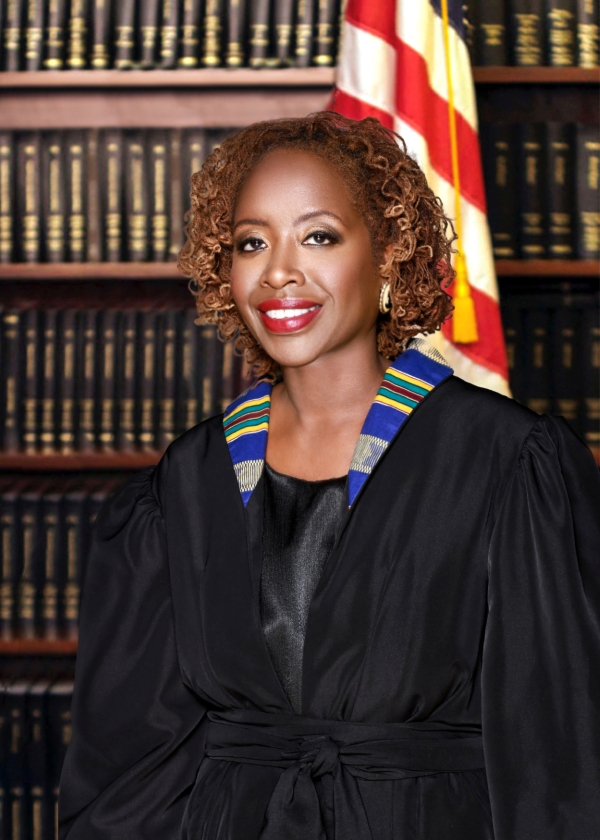Justice Tanya R. Kennedy, an Associate Justice of the Appellate Division, First Department in New York, is highlighted for her unique appreciation of the artistry involved in the practice of law and her commitment to integrating AI into the legal profession
The post is part of a limited series of blog posts and podcasts presented by the Thomson Reuters Institute, Revolutionizing Rights: AI and the Future of Legal Equality, that will provide perspectives on the use of AI in the legal sphere
While laws are clear-cut, their application is seldom straightforward. It is logical then to assume that a judge would have an appreciation for the arts. Justice Tanya R. Kennedy, an Associate Justice of the Appellate Division, First Department in New York, is uniquely positioned to appreciate the artistry involved in the practice of law.
Justice Kennedy — as an educator, during her legal practice, and during her time on the bench — has valued the nuanced craft of delivering justice, and this is all an extension of her love for the arts.
She has served as a jurist for nearly two decades, with experience spanning the Criminal, Civil, Family, and Supreme Courts. Throughout her tenure, Justice Kennedy has consistently demonstrated a commitment to staying at the forefront of the legal profession through active participation in professional associations, ongoing education, and her role as an adjunct professor. Since 2017, as part of her role with the National Association of Women Judges, Justice Kennedy has demonstrated a strong commitment to continuing legal education, particularly in the area of technology.

This dedication led her to explore artificial intelligence (AI) and generative AI (GenAI) following the public release of ChatGPT in 2022. She has also encouraged her students to engage with this technology and believes that “the current and future gatekeepers must be mentally agile to deliver justice. GenAI can sort of replace some of those mundane tasks, allowing more time for substantive work.”
Bringing GenAI into the courts
Justice Kennedy’s perspective on mental agility and preparation aligns with the principles upheld in academia. Indeed, educational initiatives in this area are underway, according to the American Bar Association’s report, AI and Legal Education Survey Results 2024, with more than half of the surveyed law schools (55%) indicating that they offer courses specifically designed to educate students about AI. Additionally, an overwhelming majority (83%) reported the availability of curricular opportunities, including clinics, in which students can learn to utilize AI tools effectively.
Overall, professional work is advancing in a manner that necessitates understanding all forms of AI. In fact, almost two-thirds (64%) of government professionals believe that the use of AI can be a positive force in their organizations, according to Thomson Reuters’ 2nd annual Future of Professionals Report — and Justice Kennedy supports that perception.
“I wholeheartedly agree that AI is likely going to be a force for good,” she says. “While no technology is without its drawbacks, when used in a transparent, ethical, thoughtful, and knowledgeable way, it can indeed be beneficial.”
Among the changes that will come from the use of GenAI and other forms of AI is more efficiency in communicating with the court, and Justice Kennedy sees the glass being half full when it comes to the changes in the methods of communication. She says her view is that AI will change the way people and courts communicate, with some of the biggest changes including:
-
-
-
- Virtual hearings — AI can facilitate virtual court appearances through video conferencing platforms, which can include AI-driven tools to manage scheduling, notifications, and technical support. This reduces the need for a physical presence in the courtroom, saving time and resources.
- Automated transcription — AI-powered transcription services can provide real-time transcriptions of court proceedings, ensuring accurate and immediate records. This can also assist in reviewing and analyzing court records more efficiently.
- Scheduling & case management — AI can optimize scheduling for court appearances by analyzing caseloads and participant availability, ensuring a more streamlined and efficient process. AI can also help in managing case documentation and deadlines.
- Language translation — AI translation services can assist non-native speakers by providing real-time translation during court hearings, improving accessibility and understanding for all parties involved.
- Predictive analytics — AI can analyze past case data to provide insights and predictions about potential case outcomes, helping legal professionals prepare more effectively.
- Document review & preparation — AI can assist in reviewing legal documents and preparing case materials, speeding up the process and ensuring thoroughness.
-
-
Considering these options, it seems that the biggest changes will be to scheduling and case management software. The analysis of necessary data and documents to manage the case load makes it much easier for individuals to interact with the court.
As advancements in GenAI and AI continue, it is essential to maintain vigilance in adopting and integrating these new tools. As Justice Kennedy suggests, the legal field must consistently prepare for these developments through both academic courses and continuing legal education. Indeed, this preparation will serve as the foundation for upholding justice in the evolving landscape and ultimately become the brush in the art of legal work.
You can hear more insights from Justice Tanya R. Kennedy on a special edition of the Thomson Reuters Institute Insight podcast, on Spotify







